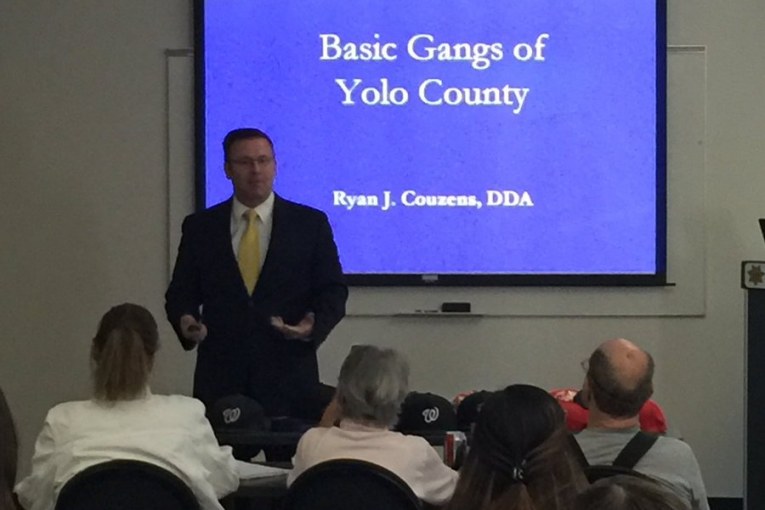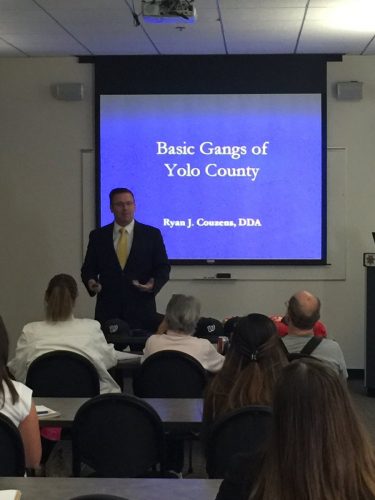

Supervisor Rexroad has made a mountain out of a molehill here. The Vanguard has for some time offered recurring monthly subscriptions as a way to create certainty of costs in order to be able to meet our financial obligations. In order to sweeten the pot, starting in April, we offered a premium newsletter to anyone who subscribed at $10 a month or more.
The premium newsletter contains a premium article only available via the newsletter.
Periodically we have as a promotion pushed out on emails or elsewhere a teaser about the premium article as a further inducement to let subscribers know the value and benefits of what they are getting.
What is odd about his complaint is that Mr. Rexroad has not to my knowledge read the article to which he is objecting. He also acknowledged, “I don’t know the county employee,” and “I have no idea what he’s supposedly done that makes him in the Vanguard’s opinion ‘problematic.'”
Instead, he is focused on a separate description that was posted on Twitter and Facebook as part of the teaser to induce people to become subscribers. His criticism of the Vanguard‘s journalism focuses not on the article itself, which he has not read, but rather a social media promotion which is separate and distinct from the article itself.
Here we promote our subscription program in Facebook and Twitter posts where we tell social media consumers that “you can only read it if you’re a premium subscriber. But if you subscribe today we’ll send it to you as a bonus.”
We have offered this kind of deal several times in the past. And the model we have developed is working – in just over two months, we have managed to vastly close our fund gap and we hope within a few months to take in as much on a monthly basis as we pay out.
Vanguard Commentary on a Deputy DA
One of Mr. Rexroad’s objections is the fact that it is a supervising deputy DA by the name of Ryan Couzens – rather than the elected District Attorney Jeff Reisig – who is the target of the critical commentary.
A few months ago, Matt Rexroad wrote a piece downplaying the importance of prosecutorial misconduct. He called new legislation, that would make the intentional failure to turn over exculpatory evidence to the defense a felony, “the latest effort in an ongoing assault on the criminal justice system.”
In the meantime, a growing body of research places a prosecutor as the most powerful person in the courtroom – and perhaps in the entire political system.
This is not an altogether new critique. “The prosecutor has more control over life, liberty and reputation than any other person in America,” said Robert H. Jackson, the former attorney general, as far back as 1940, anticipating concerns that would be aired more than three-quarters of a century later.
The prosecutor has the power to control people’s lives in ways that most actors cannot. The prosecutor decides who to charge, with what, and when to charge them – and it takes a long and protracted legal process to undo that power.
As American University Law Professor Angela Davis put it, “Prosecutors are the most powerful officials in the criminal justice system. They decide whether criminal charges should be brought and what those charges should be, and they exercise almost boundless discretion in making those crucial decisions.
“Prosecutors alone decide whether to offer the defendant the option of pleading guilty to reduced charges. When one considers the fact that more than 95 percent of all criminal cases are resolved with guilty pleas, it is very clear that prosecutors control the criminal justice system through their charging and plea bargaining powers.”
When prosecutors run amuck and violate the Constitution, research repeatedly demonstrates that they are rarely sanctioned by the bar – let alone do they face legal or civil damages for their decisions over life, liberty and property.
So to argue that a deputy district attorney is not fair game for legitimate criticism is to misunderstand the entire nature of the criminal justice system. Indeed, a deputy DA is held accountable to no one other than his boss – which means that his conduct needs to be more scrutinized, not less, given the immense power that he ultimately yields.
Angela Davis makes an equally important point: “Equally problematic is the fact that the charging and plea bargaining decisions are made behind closed doors, and prosecutors are not required to justify or explain these decisions to anyone.”
There is a lack of transparency in the system and that makes it incumbent upon the Vanguard and other organizations to report on what is really happening in the courts. We founded the Vanguard and the Court Watch Program for the very reason that the entire system lacks transparency and accountability.
Why focus on Mr. Couzens? We have been covering the courts for eight years – and he is the deputy DA that is most over-the-top, not only in his prosecutions, but in his demeanor and arguments. Don’t believe me? Ask defense attorneys that have to work with him a regular basis – and, yes, they will distinguish between prosecutors, many of whom they both like and respect even as they are adversaries.
While I understand Matt Rexroad’s argument that we need to hold Jeff Reisig accountable as the elected district attorney, the fact of the matter is that I believe, in the time we have been covering the court, he has played an active role in only two prosecutions.
The day to day face of the court is not Mr. Reisig but his deputies who have the ability to determine who to charge, when, and with what. These deputies do not face the voters and most court hearings are not publicized in the paper – and not are covered on TV like other branches of government.
So why did Mr. Couzens end up the focus of a commentary this weekend? Well, that stems from conduct that occurred in the handling of the fourth arrestee in the Picnic Day incident. As we put in the article, the latest incident “remind(s) us that we need to educate the public of the problematic nature of Mr. Couzens.”
There is a history here that the public may not be aware of. We saw some of this in the handling of the bail hearing for Lauren Kirk-Coehlo, where Mr. Couzens heavily contorted to get a no bail ruling from Judge Maguire, arguing that the vandalism “is an act of violence,” a notion that Judge Maguire dismissed as “metaphorical.”
We take you to the case of the Kalah family from 2011.
The police and Prosecutor Ryan Couzens had conducted six months of surveillance on a compound owned by several generations of an Asian family in West Sacramento. They were suspected of being gang members who were selling drugs to fund their criminal enterprise. However, when authorities raided the property, the results were less than impressive. Police found pills that turned out to be caffeine pills, powder that turned out to be Ibuprofen, and 1.4 grams of methamphetamine.
But that didn’t stop Mr. Couzens from prosecuting three generations of an Asian family on drug dealing and gang charges that put them in jeopardy of decades in prison. By the time the case got to closing arguments, charges were dismissed against one of the elders and two others would be acquitted, with a hung jury on the two younger members (with acquittals on the gang charges).
In our eight years of covering the courts, this was one of the most overcharged cases which involved considerable public expense.
But Mr. Couzens doubled down on the use of felony and gang charges in this case, launching into a manifesto during his closing remarks.
He called this a gang that was selling drugs (the jury acquitted the family on gang charges).
He said that it is irrelevant that Sacramento or Stockton would charge this crime as a misdemeanor. He said that it is on them, and their problem. He said this is Yolo County and we do things differently here.
He admitted to the jury that he is very aggressive about gangs and crimes. He said the same for his office.
He admitted that they did not find evidence of a huge drug operation. That they only found 1.4 grams of meth.
But he said that if he allowed “specks of methamphetamine” to go unchecked, if we allow a fledgling gang to go unchecked, just because it is a fledgling operation, that “that’s throwing in the towel.”
This is but one case, the main case we highlighted in the premium article, but it is also a microcosm for the aggressive nature not only of Mr. Couzens but of the DA’s office in Yolo County.
Aggressive prosecution is part and parcel to this DA’s office. Back in October of 2015, a young 13-year-old girl was shot and critically wounded in a drive-by shooting in West Sacramento.
The authorities quickly announced the arrest of Sonny Martinez. But there was one problem – he had solid evidence he was in Stockton at the time of the shooting.
And so, two months later, Mr. Martinez’s charges were dismissed.
The family asserts that, the day before dropping the charges, Mr. Couzens threatened the wife of Mr. Martinez with jail time if she did not recant her story.
She refused and it was just a bluff.
Mr. Rexroad defends Mr. Couzens, noting that he was honored as prosecutor of the year. He’s one of eight staff members who “do not simply do their jobs well, they take the initiative to fill office and community needs and in leading by example. Their colleagues, and even their supervisors, look to them for advice and revere them for their passion and problem-solving skills.”
Mr. Rexroad does bring up a good point – we should focus on the overall office in addition. After all, not only did they honor him as prosecutor of the year, but they promoted him to supervising deputy DA – and therefore condone his in-courtroom conduct and antics.
Yolo County remains near the middle in terms of crime rate, but near the top in terms of prison incarceration rate per capita in the state of California.
Mr. Rexroad wants me to apologize for all this, writing, “You owe it to your readers to provide a free exchange of information that is accurate, fair and thorough. And you owe an apology to the employee and the Yolo County District Attorney’s Office.”
The entire commentary was based on public conduct and a public accounting of courtroom behavior and arguments.
In the end, I find it patently absurd that Mr. Rexroad is demanding an apology for an article that he has never read, about a person he has never met or seen in action in court.
—David M. Greenwald reporting


Tragically, I’m not surprised by any of the information provided here.
I don’t normally weigh-in on these types of articles, but this is powerfully-written, overall. I’d like to see what Matt Rexroad (whom I also respect, but don’t always agree with) might say in response.
These types of issues are what the Vanguard seems to have the most interest in.